The concept of the value and benefit of gluten-free food has been gaining momentum for the last 10 years. Discussion related to gluten-free diets goes back to the mid-1950s, but those peer-reviewed articles were primarily focused on the treatment of celiac disease and related gastrointestinal disorders. Today gluten-free diets are being adopted as an overall health-promoting measure by broad segments of the population. Is this trend merely a fad or are there actual advantages for the average person in cutting down on gluten intake?
Gluten is a structural protein found in wheat that provides a glue-like property and helps dough stick together. Gluten-containing wheat works best for bread making, and a few thousand years ago gluten-containing wheat became the standard wheat crop. Similarly, the protein in barley and rye is predominantly gluten. Researchers posit that tens of thousands of years ago our digestive systems were optimized genetically to process a diverse diet of grains. But a modern diet is mostly composed of uniform, gluten-containing grains. Our digestive systems were not designed to process such a heavy load of gluten, and the result is the development of a range of gluten-sensitivity disorders and autoimmune diseases.1
Gluten sensitivity has been proposed as a culprit in numerous conditions, including autism, attention deficit hyperactivity disorder, schizophrenia, rheumatoid arthritis, fibromyalgia, and infertility.2,3 The link to such conditions is not clearly understood, but case reports identifying gluten sensitivity as a causal factor have appeared in numerous professional journals for more than 10 years.
For children, adolescents, and adults with such disorders, it may be appropriate to adopt a gluten-free diet to eliminate a potential source of tissue inflammation. Other persons with various nonspecific digestive complaints may also benefit from a gluten-free nutrition plan. For example, if you experience frequent, or even periodic, upset stomachs or other gastrointestinal problems, consumption of gluten may be part of the clinical scenario. Two months on a gluten-free food plan should be sufficient to determine whether gluten protein is a contributing factor to such complaints.
Going gluten-free takes a lot of dedication, time, and effort. The first step is to learn which foods in your diet contain gluten. As noted, wheat, barley, and rye are primary sources of gluten protein. Quinoa, teff, buckwheat, millet, and amaranth are gluten-free replacements for gluten-containing grains. It's important to bear in mind that many foods contain wheat and represent hidden sources of gluten, including beer, potato chips, brown rice sugar, soy sauce, and processed food such as deli meats, frozen burgers, and bread crumbs. Being gluten-free requires diligence, but the payoff may be substantial in terms of overall health and well-being.
1Sapone A, et al: Spectrum of gluten-related disorders: consensus on new nomenclature and classification. BMC Med. 2012 Feb 7;10:13. doi: 10.1186/1741-7015-10-13
2Isasi C, et al: Fibromyalgia and non-celiac gluten sensitivity: a description with remission of fibromyalgia. Rheumatol Int 2014 Apr 12. [Epub ahead of print]
3Herfarth HH, et al: Prevalence of a gluten-free diet and improvement of clinical symptoms in patients with inflammatory bowel diseases. Inflamm Bowel Dis 20(7):1194-7, 2014
